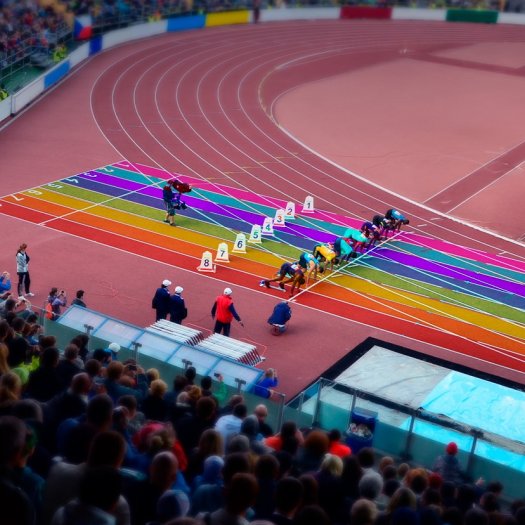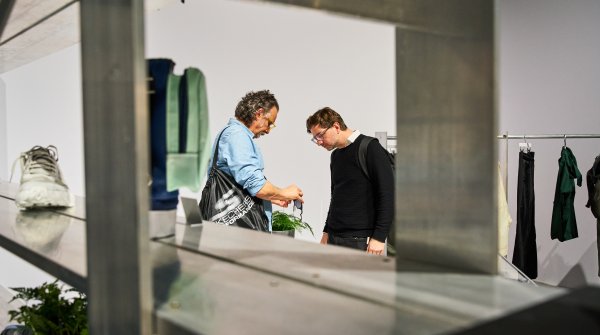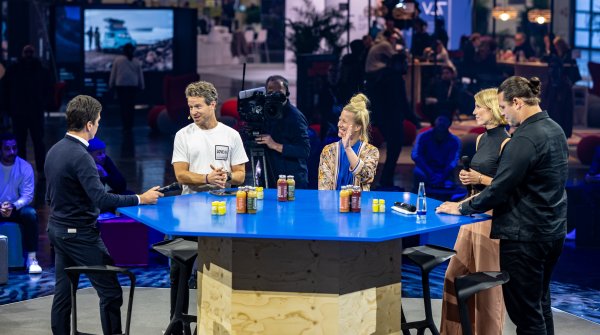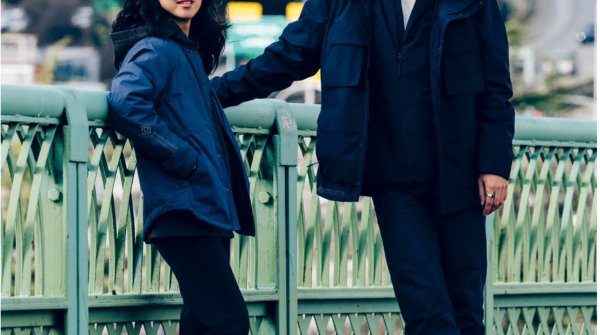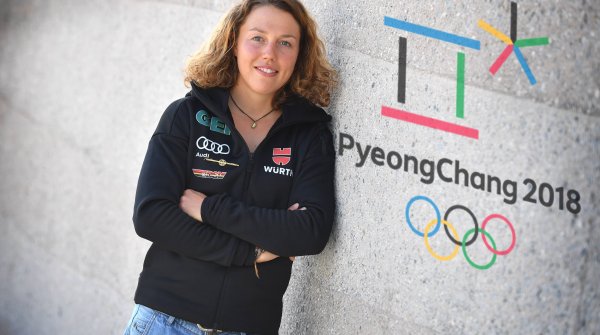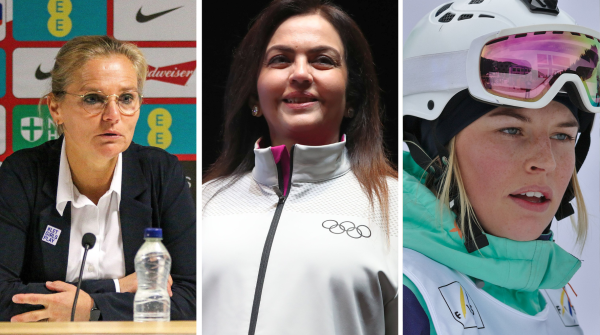Here are our top athletes who use their reach to give a voice to the LGBTQIA+ community through their outing, small gestures or large donations and their commitment to organizations and foundations.
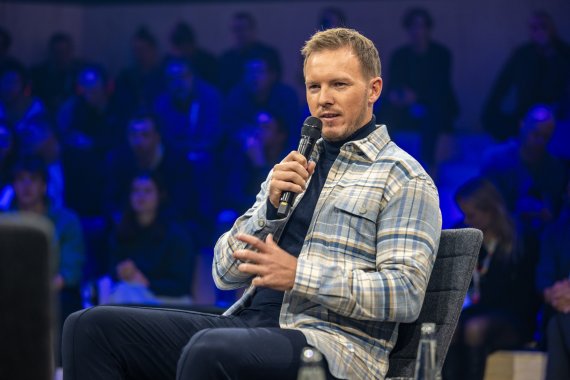
It is a very important point that you are allowed to be who you are. That you don't have to pretend, that you can be completely free, regardless of where you come from, who you love, who you want to be. And if society accepts that, it's a good step. Unfortunately, soccer still needs a bit more time on certain issues. But it's getting better and I think this openness in all areas naturally contributes a lot to the mental health of each individual.
As national coach, Julian Nagelsmann clearly advocates more openness in soccer - emotionally, personally and unequivocally. At ISPO 2024, he emphasized how important it is to show feelings and embrace diversity - not just in sport, but in society as a whole. He had previously emphasized that gay soccer players need more support when coming out. His appeal fits perfectly with ISPO's mission to make the sports industry as a whole bolder, more inclusive and mentally healthier.
At the upcoming ISPO 2025, participants can once again expect inspiring highlight speakers who will advance important topics such as diversity and mental health in sports. ISPO remains the stage where such groundbreaking conversations take place and the industry moves forward together.
I want to show the world that it doesn't matter who you are, what you believe in, what culture you come from or what background you have. Everyone is accepted in soccer.
In the fall of 2021, Australian professional Josh Cavallo caused a stir with his video "Josh's truth". He was the first player in the A-League to come out openly: "I'm a footballer. And I'm gay." He spoke about how exhausting it was to lead a double life and that no one should have to go through this experience.
Cavallo received great support from well-known footballers and clubs, including Zlatan Ibrahimovic and clubs such as Eintracht Frankfurt, Manchester City and Chelsea. In spring 2025, he announced his departure from Adelaide United to seek a new challenge in Europe. Despite sporting changes, he remains an important voice for LGBTQIA+ acceptance in soccer. In the "Footballers Unfiltered" podcast, he spoke about the death threats he receives on a daily basis and described the soccer environment as "very toxic". Although coming out was the best decision of his life, it was associated with considerable challenges.
We are constantly oppressed in many different ways. So I think the very fact that we are at the top of the sport is in some ways a form of protest and defiance.
Megan Rapinoe, captain of the US national team and 2019 world champion, is an icon for LGBTQ+ rights and equality in sport. Rapinoe ended her career in 2023 and is now even more committed to social justice. She uses her platform to openly address discrimination. In 2025, Rapinoe remains committed and involved in initiatives that promote diversity and inclusion in sport, including speaking at various international events and campaigns for equality.
There are certainly gay and bisexual men in soccer, but they don't dare to stand out from the crowd because the tone in the dressing room and among the fans there is different.
Pernille Harder, once the world's most expensive female soccer player, is a vocal advocate of the LGBTQIA+ community. She openly lives her bisexuality with partner Magdalena Eriksson and actively fights against homophobia in sport. This does not detract from her success; she won the German Championship and DFB Cup double with FC Bayern Munich. Harder repeatedly emphasizes the importance of visibility and acceptance in soccer - even though her transfer record has now been surpassed, she remains an inspiring role model.
I think it's good. It shows where we stand in our society and that we will be so far advanced in Central Europe in 2021 that we, as an open, tolerant society, will see such an action as very positive.
Manuel Neuer set an impressive example of diversity and tolerance at EURO 2020 by wearing a rainbow captain's armband - despite an initial UEFA review that was dropped in favor of the DFB. His gesture was recognized as a courageous step and symbolizes the progress for acceptance in soccer. After the tournament, Neuer's armband was exhibited in the German Football Museum as a symbol of diversity. His commitment shows how sportspeople can act as role models for equality and inclusion.
I am gay. Wow, it feels good to write those words.
Gus Kenworthy, successful freestyle skier and Olympic medalist, set a strong example for the LGBTQ+ community in 2015 by publicly coming out as gay - the first active extreme athlete ever to do so. His coming out in an interview with ESPN was a courageous step that not only attracted attention in the sports world, but also beyond. At the 2018 Olympic Games in Pyeongchang, he kissed his then partner Matthew Wilka's qualifying run - live on television. This kiss was celebrated worldwide as a sign of the visibility of LGBTQ+ athletes.
Even after his retirement from active competition in winter sports, Kenworthy remains an important voice for inclusion and equality in sport. He continues to be involved in various initiatives and uses his platform to advocate for the rights of the LGBTQ+ community.
Many are afraid to show themselves. I don't see myself as the first transgender mountain biker in Germany. Unfortunately, I'm just one of the few who have managed to say: 'Hey guys, this is me. That's the way it is now'.
Anne is one of the few openly transgender mountain bikers in Germany. She became known for her downhill and freeride videos, with which she reaches a large community. Her courage to show herself authentically makes her an important role model for more visibility and acceptance of transgender people in sport. Anne fights against fears and prejudices and inspires many to go their own way.
I came to the conclusion that if my words had the power to help even one person love and accept themselves more, it would be worth talking about.
Guillaume Cizeron, multiple world champion and Olympic ice dancing champion, sent a strong signal to the LGBTQ+ community in 2020 by publicly coming out as gay on International Day Against Homophobia, Transphobia and Biphobia. In an Instagram post, he showed himself with his boyfriend for the first time. Although he had previously come out privately, he described this step as a public coming out to help others in less open environments. Since then, Cizeron has been an important voice for visibility and acceptance in sport and is committed to diversity and inclusion in sport.
The fact that women love women is completely natural in the national team.
Lea Schüller is one of Germany's most successful female footballers and considers homosexuality in women's soccer to be completely normal. She repeatedly emphasizes that homosexuality is not a taboo subject in the women's Bundesliga and in the national team. She hopes that this openness will soon spill over into men's soccer and that more athletes there will soon have the courage to come out. Schüller acts as a role model for young female athletes and shows that success is possible on and off the pitch.
We always say that we're very inclusive in women's soccer, but somehow that's being forgotten a little bit. If we don't take strong action now, it could be too late.
Vivianne Miedema is one of the most successful female footballers in Europe and plays for Arsenal. She lives openly with England international Beth Mead. With her authentic manner, she normalizes queer relationships in professional soccer without making a big fuss, sending a strong signal to young fans. In 2025, Miedema won the Barclays Women's Super League Goal of the Season award, but then suffered a hamstring injury. Despite setbacks, she remains a leading voice for visibility and calls on the soccer world to take her lived inclusivity seriously and defend it.
If I wanted to lead a free, open life, I couldn't do that in Russia.
Daria Kasatkina is one of the best tennis players of her generation and was Russia's top player for a long time. In 2025, she became an Australian citizen after publicly admitting her homosexuality and coming under pressure due to her stance on the LGBTQIA+ community and the political situation in Russia. With her courageous coming out and her openness, Kasatkina inspires many young people around the world and sets a clear example for freedom and self-determination in sport.
In an ideal world, I wouldn't have to make this video because it shouldn't really matter.
Tom Daley, British world-class steeplechaser, made a strong statement against speculation and for more acceptance when he came out in a video he made himself in 2013. Having already achieved success as a teenager, including bronze at the 2012 Olympic Games, his courageous step has made him a celebrated role model who stands for tolerance and change in sport. Despite earlier experiences of bullying, Daley is now seen as a symbol of openness and change - in the UK and beyond.
If it meant that much to me to put the love of my life, boxing, on the line, then they knew it was something that was worth it.
Patricio Manuel is the first transgender boxer in the USA to compete in a professional fight. After his transition, which began in 2013 with hormone treatment and was completed in 2014 with upper body surgery, he previously won the US amateur women's boxing title five times. In December 2018, Manuel fought his first professional fight against Hugo Aguilar and won on points.
In addition to his boxing career, Manuel is a sought-after keynote speaker on LGBTQ+ issues and the face of Everlast's "Be First" campaign, which promotes diversity and inclusion in sport. Despite his historic success, Manuel continues to face challenges: Some opponents refuse to compete against him, making his career more difficult. Nevertheless, he remains determined to spread his message of authenticity and acceptance in sport.
Today, I'm proud that my entire team and the management of Minnesota United know that I am gay.
In 2018, Collin Martin became the first active male professional soccer player in the MLS to come out publicly. At the time, he played for Minnesota United FC and used his team's Pride Night to reveal his sexuality. His courage made him an important role model for LGBTQ+ athletes.
In 2020, Martin experienced a homophobic attack during a match when his opponent Junior Flemmings became offensive. In solidarity, Martin's team left the pitch and Flemmings was suspended. Today, Martin plays for North Carolina FC and is an ambassador for the "Play Proud" initiative for more inclusion in soccer.
Of course, I wanted to take a step with my public coming out and be a role model for daring to do things and go my own way.
In Germany, no active professional footballer has yet come out as homosexual. However, Thomas Hitzlsperger gave the LGBTQ+ community a voice in German soccer when he came out in January 2014 after the end of his career. The former national team player was the first prominent German professional footballer to go public with the topic. As a TV pundit and CEO of VfB Stuttgart, Hitzlsperger is still a prominent figure in German soccer today.
His commitment goes beyond soccer: as an ambassador for the Magnus Hirschfeld Federal Foundation, he campaigns for the rights of LGBTQ+ people and fights against discrimination. Hitzlsperger remains an important role model for acceptance and equality in sport. In February 2024, his autobiography "Mutproben" was published, in which he reflects on his experiences and his journey as a homosexual professional footballer.
It was for my sanity, for myself.
In 2013, Robbie Rogers became the first active professional soccer player to come out as gay and received a huge wave of support. Despite homophobic remarks, he stood firm and continued his career with Los Angeles Galaxy. Today, Rogers is in a happy relationship and is considered a role model for many LGBTQ+ athletes. With his openness, he wants to encourage other athletes to come out and live authentically.
I run for myself, for my community and for all those who feel like they don't belong. You do too.
Nikki Hiltz, a non-binary trans middle-distance runner from the USA, celebrates success in the 800 and 1500 meter distances and is an outspoken advocate for queer visibility in elite sport. In 2025, Hiltz impressed at several international competitions with strong finishes, including the Diamond League and the World Championships, where she was one of the most important voices for inclusion. Her presence not only strengthens athletic performance, but actively promotes a society in which all people belong.
- ISPO awards
- Mountain sports
- Bike
- Design
- Retail
- Fitness
- Health
- ISPO Job Market
- ISPO Munich
- ISPO Shanghai
- Running
- Brands
- Sustainability
- Olympia
- OutDoor
- Promotion
- Sports Business
- ISPO Textrends
- Triathlon
- Water sports
- Winter sports
- eSports
- SportsTech
- OutDoor by ISPO
- Heroes
- Transformation
- Sport Fashion
- Urban Culture
- Challenges of a CEO
- Trade fairs
- Sports
- Find the Balance
- Product reviews
- Newsletter Exclusive Area
- Magazine
